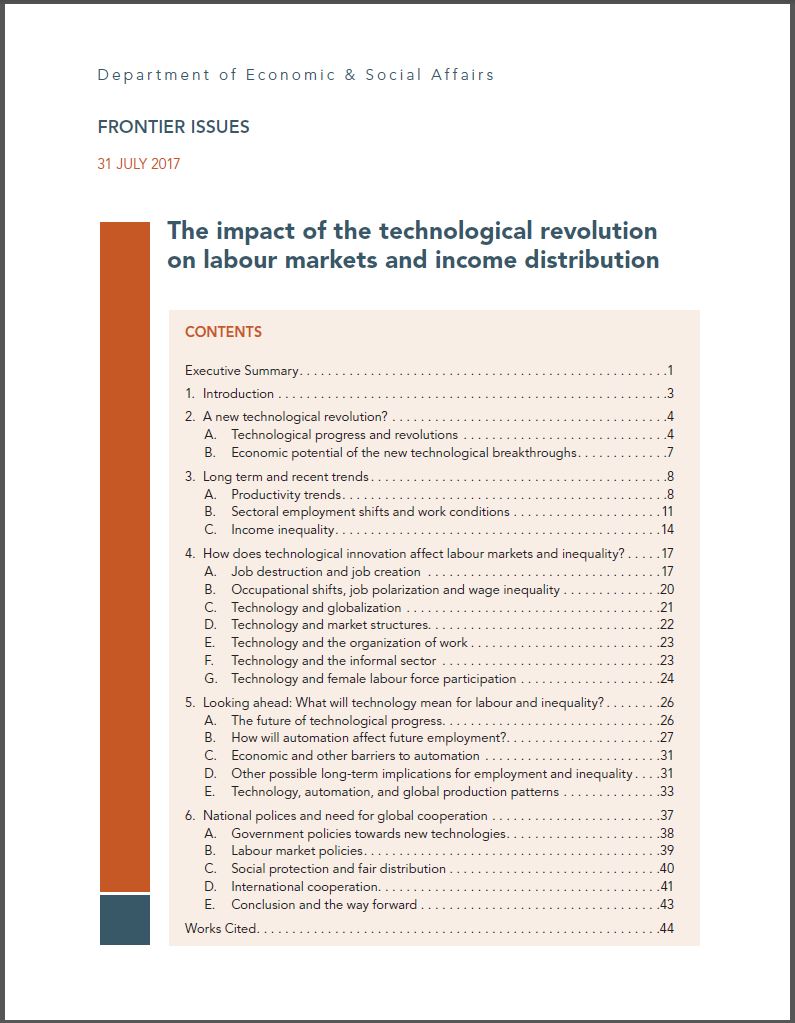
Frontier Issues: The impact of the technological revolution on labour markets and income distribution
Artificial intelligence and other technologies will define the future of jobs and incomes
Technology has had an undeniable impact on improving living standards and increasing productivity. But how will advanced technologies, such as artificial intelligence, affect jobs and wages? What will this mean for the distribution of the gains made possible by continued progress?
These and other questions are discussed in the Frontier Issues report prepared by DESA’s researchers, in collaboration with UNDP, ILO and UN Women: “The impact of the technological revolution on labour markets and income distribution”.
The promise and pitfalls of technological progress
Technology has always been at the forefront of social and economic progress. Today, the pace of breakthroughs in several clusters of technology—from gene editing to machine learning and advanced materials—may signify that a new technological revolution is at hand, which could be not only transformative for almost every industry and every country, but also disruptive.
Just as these new technologies hold immense promise, there are concerns that technological innovation will lead to increased unemployment, suppressed wages and greater inequality. There are fears that machines enabled by artificial intelligence will replace many human jobs, resulting in mass unemployment and impoverishment.
However, the impact of these new technologies on labour markets and income distribution is not predetermined. The right policy mix and institutional arrangements can ensure that benefits of innovation are shared broadly, an essential step to achieving the SDGs for all. Governments, as well as the United Nations, should create a regulatory and legal framework that facilitates the adoption and diffusion of new technologies, while helping to address their negative consequences.
CONTENTS
- Executive Summary
- Introduction
- A new technological revolution?
- Technological progress and revolutions.
- Economic potential of the new technological breakthroughs
- Long term and recent trends
- Productivity trends
- Sectoral employment shifts and work conditions
- Income inequality
- How does technological innovation affect labour markets and inequality?
- Job destruction and job creation
- Occupational shifts, job polarization and wage inequality
- Technology and globalization
- Technology and market structures
- Technology and the organization of work
- Technology and the informal sector
- Technology and female labour force participation
- Looking ahead: What will technology mean for labour and inequality?
- The future of technological progress
- How will automation affect future employment?
- Economic and other barriers to automation
- Other possible long-term implications for employment and inequality
- Technology, automation, and global production patterns
- National policies and need for global cooperation
- Government policies towards new technologies
- Labour market policies
- Social protection and fair distribution
- International cooperation
- Conclusion and the way forward
- Related:
- Presentation: The impact of the technological revolution on labour markets and income distribution
- Development Policy Seminar: Frontier Issues:The impact of the technological revolution on labour markets and income distribution
This study was prepared by the Department of Economic and Social Affairs in response to a request by the Secretary-General’s Executive Committee to provide an evidence-based analysis of the link between recent technological progress, labour markets and inequality. The United Nations Development Programme, the International Labour Organization and UN-Women also contributed to the report. Please send your inquiries or feedback to Matthias Bruckner; Marcelo LaFleur; and Ingo Pitterle via our contact form.

Follow Us